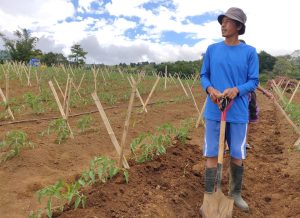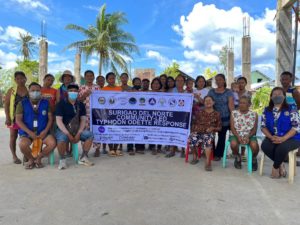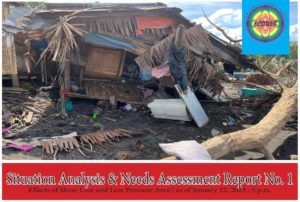After the Marawi siege in 2017, thousands of Meranaws experienced a massive displacement in and around Lanao del Sur. Some of the internally displaced persons (IDPs) sought refuge in the Municipality of Balindong. Barangay Abaga is one of the host barangays where three (3) community solidarity groups (CSGs) were formed by ECOWEB composed of various sectors such as the farmers, women, and youth.
Under the USAID-funded Marawi Response Project (MRP) in partnership with Plan International and ECOWEB, the CSGs have undergone different community assessments to identify their priorities and how to improve their economic conditions.
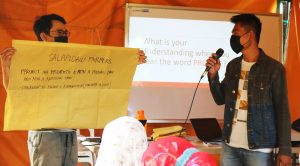

Photo: Members of Salapidao Farmers and Women Friendly Space Group report about their understanding of the impact of community projects during the assessment in their barangay.
The major economic activity of the community based on the assessment reports is farming. However, 60% of the farmers have no post-harvest facilities and 40% of them have no farm animals and rely on manual plowing. Farmers find it difficult to have enough income due to the scarcity of resources and most of them eventually adopted an equal sharing of farm produce to help other farmers to at least have food to offer on their tables. 
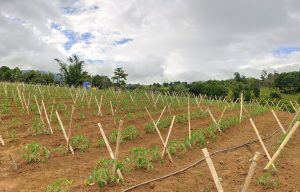
To note, the municipality itself has 453.94 square kilometers land area which constitutes 3.02% of Lanao del Sur’s total land area. By this, barangay Abaga alone has high potential in the agriculture industry due to its abundant agricultural land.
Hence, the approval of an IDP-written proposal to develop a provincial demonstration farm to increase the income of the farmers and uplift the agricultural status in the province after months of being unstable.
“Akala namin hindi kami makapagsimula dahil maraming pagsubok na dumaan, pero nagsimula kami kahit konti lang ang naging active sa mga members, nagtulungan kami para maisakatuparan ang plano. Ngayon, sobrang masaya na nakikita namin yung resulta ng paghihirap namin.” said Abdullah G. Macabangon, 40, IDP leader of Salapidao Farmers
[“We thought we couldn’t start because we went through a lot of trials, but we started even though only a few members became active. We worked together to carry out the plan. Now, we are so happy to see the results of our sacrifices.”]
The demo farm is a great opportunity to heighten food security and put forward agricultural productivity in the province as it targets to supply diverse products to more than 103 households in the barangay and potentially, to the 32,573 residents of the province and its neighboring communities.
Formed CSGs in the barangay including Salapidaw Farmers’ Association, Women Friendly Space, and Abaga Youth composed of more than 60 members were clustered as one and tasked to manage the entire grant. This grant was also provided concerning the project’s value chain component to enable farmers to beef up the production of their agricultural products.
To solidify the purpose of the demo farm, this will be an example to other farmers from neighboring municipalities to improve financial security. This can be done through planting produces that are suitable for local conditions and by lowering the cost of production while providing good quality of products to increase the group’s outturns and profit.


Photo: Demo farm in Abaga, Balindong with the greenhouse shelter and the ready-to-harvest crops.
This can also be a reference for others to develop their farms and offer diverse types of crops while improving strategies to create a healthier environment and boost economic transformation in their locality.
Meanwhile, the local government unit of Balindong, Lanao del Sur offered support to the CSGs by providing them with other needs for project start-up and ensuring the development of technologies and techniques to improve agricultural systems in the farm.
In addition to the in-kind grants, MRP has capacitated the project proponents with technical supports like farming skills enhancement activities and trainings, entrepreneurial management,
and other necessary capacity-building initiatives to improve the proponents’ skills in farming and operational systems.
Approximately, four (4) hectares of land were already utilized for an estimated 18,000 planted high-valued crops and vegetables. Crops include tomatoes, pepper, cucumber, banana (lakatan), and coffee. The groups expect to harvest the crops around December 2021 to January 2022.
Currently, the farmers are closely monitoring their crops for pest infection and wild animals. They also expressed that they need assistance during this period because they have insufficient resources and limited knowledge on pest management and control.
